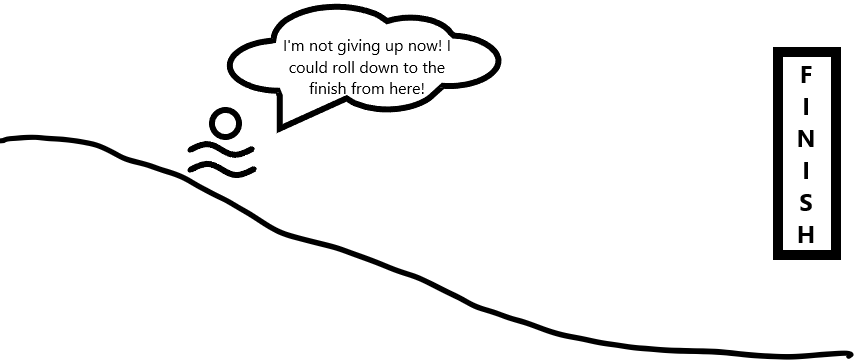
What is taper?
Sometimes, I feel like taper is a downhill at the end of training. Simply put, it is decreasing intensity and/ or volume of training just before the race. Depending on the sport and distance involved, it lasts between 4 and 28 days. Obviously, the duration increases with the length of the competition. Higher impact sports also call for more taper time.
I tried to figure out what’s the shortest race you should taper for. Believe it or not, this guy said you should do it even for 5k and 10k! Well, if you mean that you probably shouldn’t do anything extra hard, I guess I can sort of see it…
What are the benefits?
When you train, you tear your body down and exhaust yourself. Taper is time to fully recover from all that hard work. By the time you are 2-4 weeks out from the competition, you have done pretty much everything you can to get in shape. Now it’s time to allow your body to heal up and get ready for the big day. It also helps avoid any last-minute injuries, which can put a real damper on your performance.
How much faster you can go? I have seen a wide range of answers, influenced by type of taper and variety of other factors. Many just stick with 3%, but I have seen it listed as up to 22%. The lower limit may not sound like much, but if you’re trying hard to qualify for Boston, these few seconds may make all the difference!
Something I found not to be mentioned enough: after all this training, taking a bit off will allow your mental state to recover. You will want to run and ride and swim again! I have heard numerous runners a couple of weeks away from a marathon saying that they want all this training to just be over. Taking a few easy weeks will help with the mental fatigue!
Last but not least: it’s also time to do the carb loading (read up on that here). If you put a very high mileage all the time, it’s difficult for your body to store up the glycogen in your muscle – you keep burning it! But after a week of a high-carb diet without excessive exercise? Yes, please! We will keep this energy waiting for you!
Quick warning
As most avid runners and cyclists will tell you, not getting your run/ride can put you in a foul mood. Please don’t hurt others around you… You may need to take your mental health (and happiness of others) into account when tapering. I heard some have ‘taper tantrums’. We don’t need athletes to turn into bratty toddlers! Over the years, hopefully you will develop some coping mechanisms. Just remember not to overdo it! Spending 6 hours on that construction project instead of going on a run is not proper taper.
How to go about it?
Decreasing volume
Your training has two basic components to it: volume and intensity. Let’s start with decreasing volume, since there is a consensus on it: you should shorten your workouts and not do them every day. Like every other day seems like a good compromise.
Decreasing intensity
This part brought a bit less clarity. Some said you should do intervals training, do many of your workouts at race pace or just the opposite: just jog a bit without rushing anywhere. Honestly, it left me completely confused. I did develop my own best advice here: don’t put in workouts that will leave you completely beat. So if you’re going to do a marathon, a 5k at your race pace isn’t that bad. And if you haven’t been doing much interval training, don’t do it! And definitely not for like every workout. You will just create new source of fatigue this way. That’s opposite of helpful. Plus you’re risking developing an injury.
I hope this sheds some light on the issue of taper. Now go get out there and keep training!
